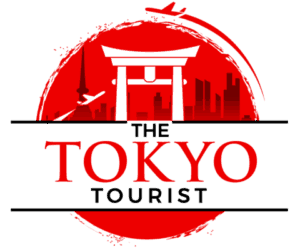Deprecated: mb_convert_encoding(): Handling HTML entities via mbstring is deprecated; use htmlspecialchars, htmlentities, or mb_encode_numericentity/mb_decode_numericentity instead in /home2/thetoky7/public_html/wp-content/themes/acabado/functions.php on line 2119
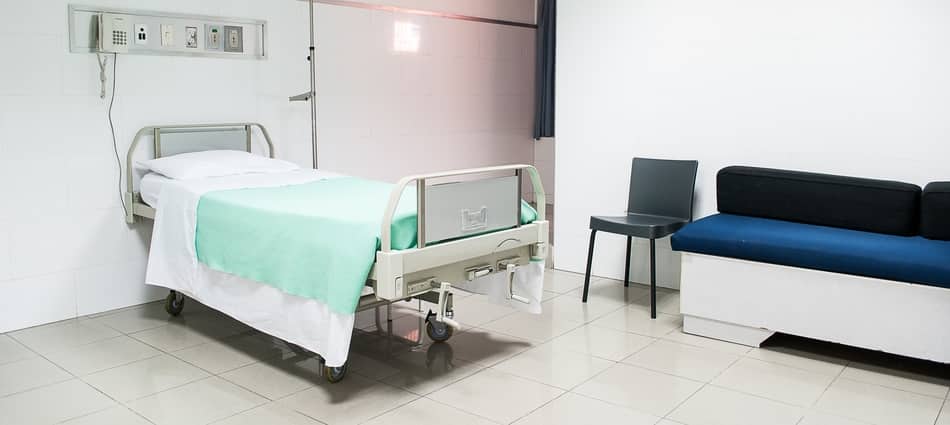
Getting sick or injured in a foreign country can be scary. What happens if you get sick in Japan? First of all, how do you get help? Second, what about the language barrier? Will you be able to communicate your pains and problems and will you be able to understand the medical personnel’s instructions? Thirdly, let’s hope you survive, but will it kill your wallet? Should you have travel insurance when you visit Japan?
This is a guide to what you should do if you fall ill or get injured in Japan. I’ll also cover how the health care system works in general for residents of Japan and how much it costs compared to other countries. First, let me say this: If you get sick in Japan you’ll probably be in very good hands. If you’re uninsured, it might cost you, but it probably won’t bankrupt you, as long as you’re not extremely unlucky and get badly injured or fall victim to severe and longterm hospitalized illness. Should you get travel insurance before you go to Japan? I’m my opinion it’s totally worth it, and you should make sure your insurance also covers medical evacuation.
Let’s dive into the details!
What You Do if You Get Sick in Japan
Of course, it depends on how sick you are! Let me draw up three different scenarios and give you a quick rundown of how you can handle the situations. I’ll go from sniffle to severe illness or injury.
1. You Catch a Cold
If you’re like me, you don’t feel the need to see a doctor if you get a simple cold. We’ve all had colds, so we’re quite used to what to expect and how to handle them. You know the deal, you have a runny or stuffy nose, you cough, you have a sore throat, maybe a headache and possibly a slight fever. It’s certainly not a comfortable state of being, it sure makes you feel miserable, and the timing is awful because you want to experience Japan! What can you do to make it more bearable? Self-medicate!
If you look up how to treat and cure a cold, the number 1 tip is to get plenty of rest. Unfortunately staying in bed is not an option, because you have places to see and pictures to take. You need to turn to the pharmaceutical industry for help. In your home country, you probably have your go-to drugs to sort out your stuffy nose, suppress the coughing and relieve a sore throat. Good luck with finding those in Japan! What are your options?
Over-the-Counter Cold and Flu Meds
I’m not going into great detail, because my number 1 recommendation is very common all over Japan. I’ve used both of these with good results. By the way, I’m not affiliated with big pharma, so these are just my honest recommendations based on my own experience. 🙂
Estacibu Fine EX
This medicine comes in the form of tablets, and they’re used to treat everything from “normal” to heavy colds. It claims to help you with fever, runny nose, coughing, and pain. It’s easy to get a hold of and one of the most common cold medicines in Japan. You can find it at most drugstores throughout the country. When I tried it, it worked like a charm. Either that or the placebo effect fooled me. Anyway, it worked!
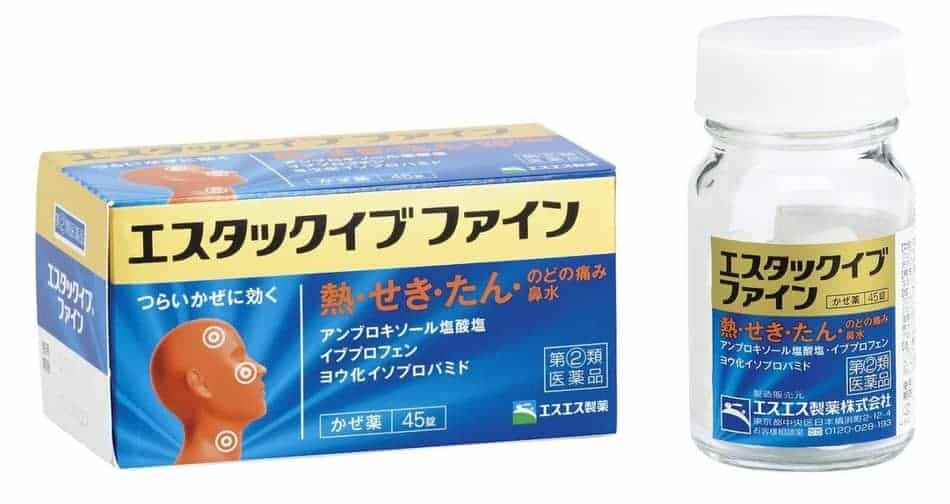
Still not convinced? Take a look at this video (Japanese). It pretty much says the same as me in just a more exaggerated and enthusiastic way!
Precol Long-acting Capsule
Precol is one of the strongest over-the-counter cold medicines and you should not administer it to persons under 15 years. According to the product description, this medicine will cure (here it comes, take a deep breath): Sore throat, fever, runny nose, stuffy nose, cough, sputum, chills, headache, joint pain, muscle pain and sneezing! Not bad! It even contains caffeine which can be extremely useful if you’re feeling a bit dull from the cold.
If I only have a sore throat and a stuffy nose, I’d go with Estacibu. If you’re really miserable I’d go with the Precol because it’s a stronger medicine and it contains caffeine so you’ll probably feel a bit more alert.
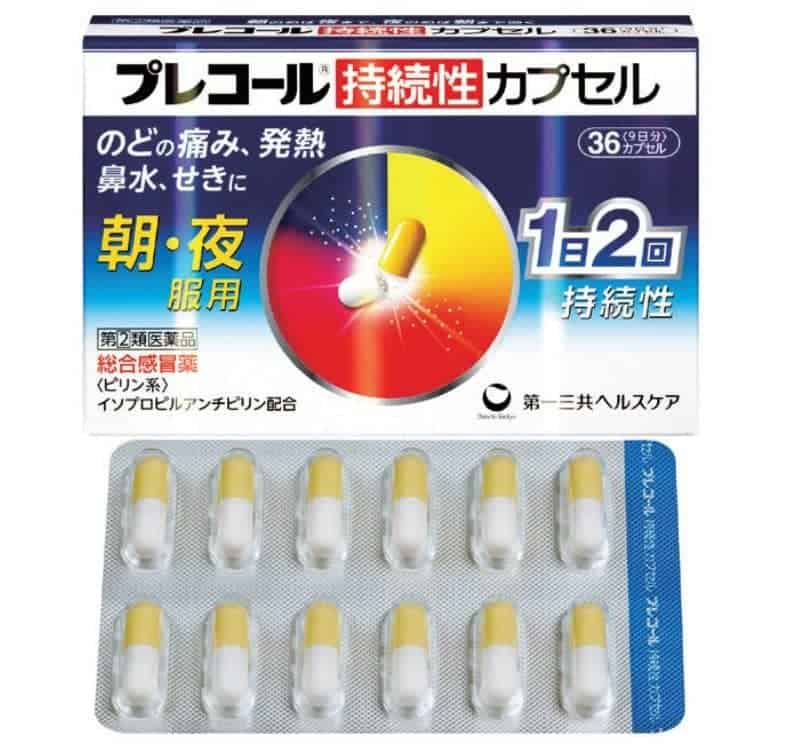
Where Do You Buy the Meds?
Unfortunately, you will not be able to buy these medicines in convenience stores. You need to go to a drugstore. There are two different stores selling medicine in Japan. One is more like a drugstore (kusuriya) and the other is more like a pharmacy that fills prescriptions (yakkyoku). Compared to the USA the drugs are fairly expensive. Estacibu and Precol are priced at 2 000-2 500 yen and lasts about a week.
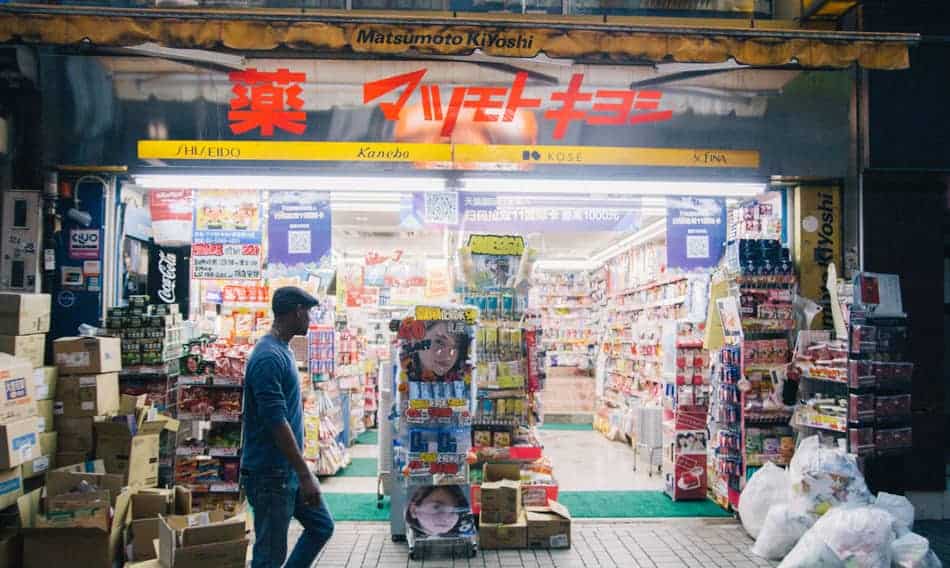
Protip: As soon as you feel a slight cold be sure to get a surgical mask/medical mask. It’s considered rude to cough and sniffle in public because you’re spreading germs. Also, for the same reason be sure not to blow your nose in public. Use a restroom!
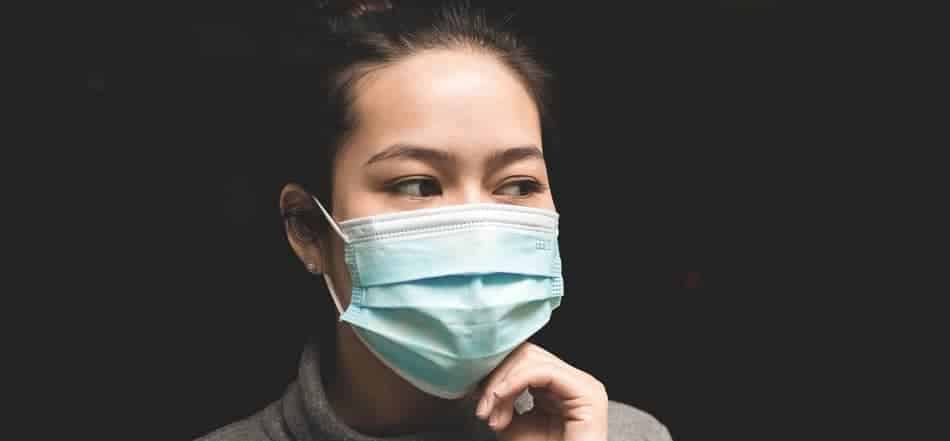
2. What if You Get Sick in Japan and Need a Doctor?
You get some sort of illness and want to get it checked out by a doctor. Maybe you need prescription drugs like antibiotics, strong painkillers or anti-inflammatory medicine. In most countries, you’d head over to your GP (general practitioner) and get her/him to sort you out. But guess what. There’s no general practitioner system in Japan! Doctors work at hospitals or clinics and are specialized in one field of medicine. Therefore patients must decide which specialist to visit according to their symptoms. So how many fields are there? You have well over 20 fields of specialization. To me, this is kind of scary!
You’re already ill and in such a miserable condition you feel like you need to see a doctor. And now you have to start self-diagnosing to find out which specialist you need to see? Man, I feel the pressure just from writing about it. But after going through all the specialist departments I don’t think it’s that bad, you’ll probably figure out where to go. And if you happen to see the wrong specialist they’ll quickly examine you and just send you on your way to the right kind of specialist. A small fee may occur.
Go to a Clinic or Hospital
First of all, I would advise you to seek out an English speaking clinic. There is no guarantee that a doctor in a normal Japanese clinic knows English well enough understand everything you say when it comes to your symptoms. Also, she/he might have problems clearly expressing both what the diagnosis is and what the instructions are. I’m not at all saying it’s impossible to get good and efficient help at a non-English speaking clinic, but since we’re talking about your health I would prefer it if you managed to find an English speaking clinic. After all, you’re so sick or injured you’ve decided to go to a hospital or clinic during your vacation.
These are the steps in a normal visit to the hospital/clinic
Firstly: Remember to bring ID, money (sometimes you have to pay in cash) and your insurance card (if you have one).
- Fill out a first-time registration form
- Hand in the form, your ID, and your insurance card (if you have one) at the front desk.
- You’ll be handed a Patient ID card and a medical chart.
- Find the next desk (the right department if you’re in a hospital) and hand in your Patient ID card and your medical chart.
- A nurse will give you a medical questionnaire you’ll have to fill out and submit.
- Sit and wait your turn until you are called.
- You’re then called and several examinations can be done depending on what your problems are.
- When the consultation is over be sure to make a follow-up appointment if that’s necessary. Then collect your bills and Patient ID card.
- Bring the bills to the cashier and pay. IMPORTANT: Be sure to save the receipt if you have travel insurance and need it to get reimbursed.
If the doctor prescribed you some sort of medication, be sure to ask at the clinic/hospital where you can fill it. You need to go to a pharmacy (yakkyoku) and not a small drugstore (kusuriya).
Here are some useful resources:
- American Clinic Tokyo. This is an appointment based clinic. It’s located in Akasaka, Tokyo and has been serving the English speaking international community for over 60 years.
- Not in Tokyo? Use this website from the Ministry of Health, Labour and Welfare to check out each prefecture’s basic information on its hospitals and clinics.
- AMDA International Medical Information Center provides telephone services to foreign residents in Japan in several languages. Their website is also super helpful and can walk you through a lot of the steps you need to take if you get sick.
How Much Does it Cost?
This is of course what you’re all wondering! What are the medical health care prices like in Japan? To give you a point of reference, japanhealthinfo.com recommend foreigners without Japanese Health Insurance to bring this amount of money for first consultations:
- 20 000 yen at a clinic
- 20 000 – 50 000 yen at a hospital
First-time consultations are normally more expensive than follow up appointments. You can also ask for an estimate of your future costs when you are arranging your next appointment.
A worst-case scenario for a first consultation is 50 000 yen, which translates into about $450 with the exchange rates of August 2018. If you end up with a bill of 50 000 yen you’ve probably undergone quite a few tests (x-ray, MR, CT and such) and been thoroughly examined by a doctor. And remember, you may have to pay for any prescribed medication on top of that.
3. You Get Badly Injured or Get Severely Sick
This is the third and obviously worst scenario. I cross my fingers you don’t have to experience this. But first, if you’re planning a trip to Japan you might as well whip out your phone and save these two numbers:
Police: (+81) 110
Ambulance/Fire: (+81) 119
Nervous about calling an emergency number in a foreign country? Use this guide to get some pointers on what you should say and how you should say it.
If you ever need an ambulance you’re probably in dire straits but at least you don’t have to worry about a humongous ambulance bill, because it’s totally free in Japan. But how much are medical procedures and hospital stay in Japan compared to other countries?
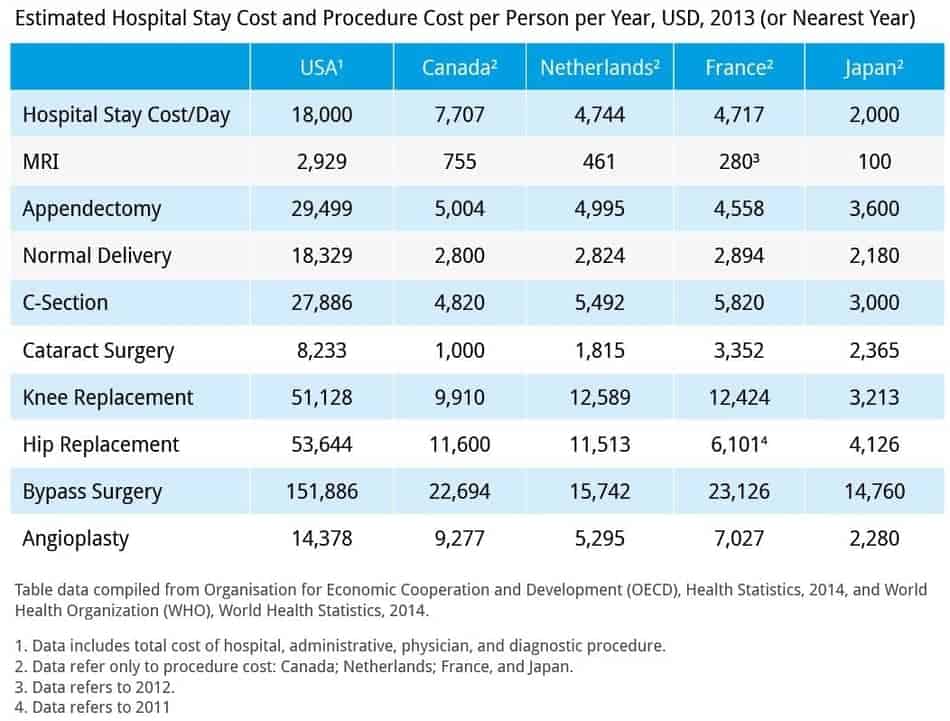
As you can see Japan is not that bad compared to some other countries but even if you don’t risk ending up with a bill the size of your yearly salary it can still hurt you. That brings me to the next topic: Health insurance.
Should You Get Health Insurance Before You Go to Japan?
In my experience, there are three schools (at least) when it comes to insurance.
- Cautious: Insure everything
- Happy go lucky: Insure nothing (except the things you are legally required to)
- Something in between: Insure the big things
Personally, I adhere to the third option. I don’t insure my phone or my bike. But I do insure my house and my health. The reasoning behind it is that if you have a stable economy, you can always just get a new phone or bike right away. So I’ve decided to accept that risk to avoid the monthly premium.
If I’m hospitalized in Japan for five days ($10 000) it wouldn’t ruin my life nor bankrupt me but it would deplete much of my savings and to be honest, it would annoy the sh*t out of me. But that’s not my main reason for why I always travel with travel insurance.
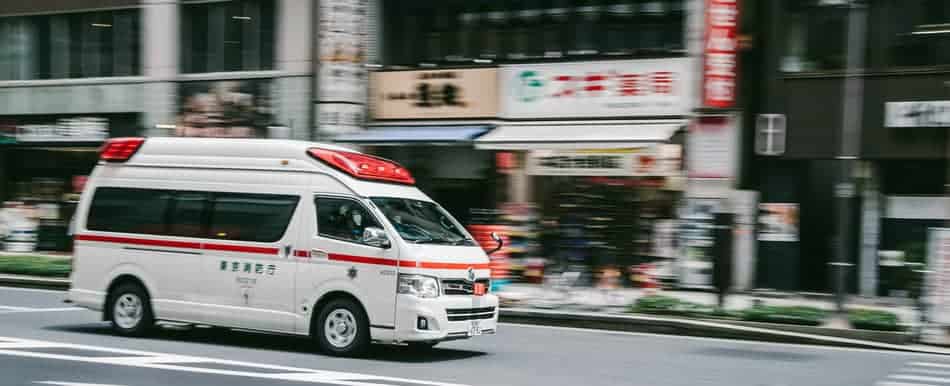
Like Lightning From a Clear Sky
You are in your mid-twenties and fit as a fiddle. You explore Tokyo and you don’t have a worry in your life. It’s nighttime and you’ve already had a few and now you’re on your way to Shibuya to check out the party ward. And then it happens. You slip down the staircase leading down to the subway and fall on your back and break it. You end up in the hospital for three months before being flown back home occupying the space of nine seats and you are accompanied by a doctor. $350 000 thank you very much! I know, it’s a bit of a scare story bit it actually happens.
Whereas I could live with a $10 000 hospital bill, a bill of $350 000 would certainly bankrupt me. Although the chances are very slim for something like that to happen, I’m not willing to take the risk. Therefore I would rather pay the monthly premium than to gamble with my future. And remember a good travel insurance will cover trip cancellation, trip interruption, trip delay and lost or delayed baggage as well.
Before you think of buying travel insurance, be sure to check if you already have coverage. Most credit cards have some sort of coverage, but rarely medical evacuation. If you already have coverage for medical procedures, you can always buy coverage for medical evacuation as a short-term add-on. Also, be sure to check with your employer if you have some sort of international health insurance and, if so, what it covers.
If you need travel insurance with good coverage you can check prices here.
How the Japanese Health Care System Works for Residents
All residents of Japan are required by the law to have health insurance coverage. Either you have it through your employer or you’ll need to participate in a national health insurance program, administered by local governments. In theory, the coverage should be 100% – but it’s not. According to japantimes.co.jp 8.55 percent of people do not pay premiums. This is mainly due to two reasons. There’s a Japanese law that states that the government is obligated to provide care for those with “troubled livelihoods,” at low or no cost, regardless of insurance coverage. If you are poor and can’t afford a health insurance, you can still see a doctor and get sorted out if necessary. The second reason is a loophole.
The Loophole
Because the insurance programs are administered by local governments you can move between cities to avoid paying. The best thing is: You don’t even have to move! You just claim to be moving. It works like this: Let’s say you live in Tokyo and want to avoid paying the mandatory insurance premium. Then you have to send a letter to your local city government and declare that you’re moving to another city. You also need to submit your new address. Now Tokyo will stop sending you insurance premium bills. When you move (or just claim to, without moving) to a new city, it’s your responsibility to contact the city government and sign up for their health insurance program. If you follow this procedure (thank you to my friend Hidemaro for the information!) you should be able to avoid paying health insurance premiums.
But Wait! What?
“Won’t you lose your health care coverage?” you ask. Well, that’s the problem and that’s why I in no way, shape, or form endorse this. If you get sick or injured you are now without coverage but not only that: If the government finds out that you’re without mandatory health insurance they will look into your records and make you pay for all the months you missed, and then hand you a fine.
What does the National Health Insurance Program Cover?
In Japan, you have a copayment system. Basically, when you have insurance the government will split the bill 70/30 with you. The patient covers 30% of the medical costs while the government pays the remaining 70%. On top of this, there’s a cap on how much your 30% can amount to monthly. Once a patient’s monthly copayment reaches a cap, further copayment is heavily reduced. The cap is tiered into three levels based on income and age. If you are under the age 70 with a modest income, the cap is at 80 100 yen (about $720). When you reach and exceed the cap you go from paying 30% of the medical bill, to 1%. It’s designed this way so everybody can have access to health services without incurring financial hardship
You Can Get an Additional Insurance plan
There are insurance programs called “Top up coverage” that will cover your part (the 30%) of the copayment and non-covered costs. An example of a non-covered cost is injury due to bad behavior such as fighting and drunkenness. The “Top up coverage” has a fixed payment per days in hospital or per surgery performed, rather than per actual expenditure.
What does the National Health Insurance Program Cost?
So how much do residents in Japan pay for a health insurance that’ll cover 70% of your medical bills and 99% of them if you exceed the cap? The quick and dirty answer is about 4% to 5% of your annual income. But there are many factors and it’s managed by each local government. This results in wildly different health insurance premiums depending on where you live. According to japanhealthinfo.com: “For these reasons, it is difficult to estimate how much your personal premiums will be in advance. For reference, the highest premiums (for high-income earners, not average or low earners!) is approximately 900,000/year in Tokyo but 400,000 yen/year in Chiba.”
Why is Japanese Health Care Reasonably Priced?
I know it can be touchy to talk about health care prices but I think it’s safe to say that Japanese health care is fairly cheap. (Click here to jump up to the country comparison). Why is it that the hospital stay cost is $2 000 in Japan, $4 700 in the Nederlands and France, $7 700 in Canada and a whopping $18 000 in U. S.? Rather than going into why health care is so expensive in the other countries, let’s instead focus on how it’s so cheap (in comparison) in Japan.
There’s a non-profit focus within the health care system. Hospitals, by law, must be run as non-profit and be managed by physicians. For-profit corporations are not allowed to own or operate hospitals. Clinics must be owned and operated by physicians. Japan is tightly regulating the health industry. The costs of services are controlled by the government and fees for all health care services are set every two years by negotiations between the health ministry and physicians.
These are just some of the reasons why the Japanese health care system is more affordable than health care systems of many other countries.
Conclusion
I hope you found this information useful, but I also hope you don’t need to use it when you visit Japan. 🙂 Anyway, if you get sick in Japan you probably won’t get bankrupted unless you’re extremely unlucky. If you’re willing to take the chance, be my guest. If you’re slightly more risk-averse (like me!) get a travel insurance with medical evacuation.
